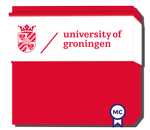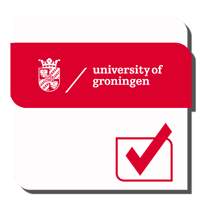Digital Credentialing
Ontdek de toekomst van leren en onderwijs met Digital Credentials
In een snel veranderende wereld is de behoefte aan flexibel onderwijs van hoge kwaliteit belangrijker dan ooit. Aan de Rijksuniversiteit Groningen zijn we pioniers op het gebied van digital credentialing om kleine eenheden van het hoger onderwijs te certificeren, waardoor lerenden en professionals beschikken over erkende en waardevolle kwalificaties die gemakkelijk te tonen, te verifiëren en te delen zijn.
Wat zijn Digital Credentials?
Wat zijn Digital Credentials?
Digital Credentials zijn een nieuwe manier om onderwijsprestaties te certificeren die kleiner zijn dan een volledig diploma. Ze dienen als keurmerk voor kleine volumes hoger onderwijs en vaardigheidstrainingsmodules, en vereenvoudigen de erkenning van je leerresultaten door andere instellingen en werkgevers. Aan de Rijksuniversiteit Groningen experimenteren we momenteel met het certificeren van 'accreditatiewaardig' onderwijs door middel van microcredentials en het certificeren van vaardigheidstrainingen door middel van proof of competence certificaten, beide uitgegeven door middel van digital badges.
Waarom Digital Credentials?
Waarom Digital Credentials?
Voor individuen:
-
Onderwijs van gewaarborgde kwaliteit: Profiteer van kleine, flexibele cursussen die kwaliteitsgegarandeerd en gecertificeerd zijn.
-
Carrière vooruitgang: Verbeter je carrièrevooruitzichten of vergemakkelijk een carrièreswitch.
-
Persoonlijke ontwikkeling: Stem je opleiding af op je persoonlijke interesses en professionele doelen door middel van doelgericht leren dat past bij je werk- en levensverplichtingen.
-
Maak je vaardigheden klaar voor de toekomst: Blijf op de hoogte van opkomende trends en ontwikkelingen in de sector.
Voor werkgevers:
-
Sluit gaten in vaardigheden: Vul tekorten aan vaardigheden binnen je organisatie aan met erkende, verifieerbare credentials.
-
Kwaliteitsstandaarden: Vertrouw op digital credentials die ontwikkeld en op kwaliteit gecontroleerd zijn door toonaangevende instellingen voor hoger onderwijs.
-
De ontwikkeling van werknemers ondersteunen: Verhoog de productiviteit en loopbaanontwikkeling van je personeel door digital credentials op te nemen in je trainingsprogramma's.
Navigeer direct naar:
Meer informatie en meedoen
Als onderdeel van het strategisch plan 2021-2026 van de Rijksuniversiteit Groningen zetten we ons in om het gebruik van digital credentials in ons onderwijsaanbod uit te breiden. Of je nu een docent bent die geïnteresseerd is in het ontwerpen van digital credentials, een professional die zijn vaardigheden wil verbeteren of een werkgever die zijn personeel wil ondersteunen, we nodigen je uit om onze mogelijkheden te verkennen en betrokken te raken bij dit innovatieve initiatief.
Digital Credentialing bij de RUG
Microcredentials
Microcredentials
Microcredentials zijn digitale certificaten waarmee leven lang lerenden de kennis en vaardigheden kunnen aantonen die ze hebben verworven na het voltooien van een onderwijseenheid die kleiner is dan een volledige opleiding. In tegenstelling tot een privécursus vertegenwoordigt de microcredential accreditatiewaardig onderwijs met traceerbare en verifieerbare leerresultaten. Microcredentials kunnen speciaal ontworpen cursussen zijn of onderdelen van bestaande opleidingen. Het bereik is 3 tot 30 ECTS.
Vanwege wettelijke beperkingen kunnen microcredentials in Nederland alleen worden toegekend aan professionals en (nog) niet aan reguliere studenten. In het kader van de landelijke pilot verkent het ministerie van OCW momenteel de mogelijkheden om microcredentials te verankeren in de Wet op het Hoger Onderwijs (WHW). In dit kader zal ook gekeken worden naar mogelijkheden om microcredentials uit te reiken aan reguliere studenten.
Voor een microcredential gelden dezelfde kwaliteitsstandaarden als voor geaccrediteerd onderwijs.
Volgens de aanbeveling van de raad betreffende een Europese benadering van microcredentials voor een leven lang leren en inzetbaarheid op de arbeidsmarkt van 16 juni 2022, worden microcredentials op Europees niveau als volgt gedefinieerd:
Microcredential: het bewijs van de leerresultaten die een lerende heeft behaald na een klein leervolume. Deze leerresultaten zijn beoordeeld aan de hand van transparante en duidelijk omschreven criteria. Leerervaringen die leiden tot microcredentials zijn bedoeld om de lerende te voorzien van specifieke kennis, vaardigheden en competenties die beantwoorden aan maatschappelijke, persoonlijke, culturele of arbeidsmarktbehoeften. Microcredentials zijn eigendom van de lerende, kunnen worden gedeeld en zijn meeneembaar. Zij kunnen op zichzelf staan of tot bredere credentials worden gecombineerd. Zij worden ondersteund door kwaliteitsborging volgens overeengekomen normen in de betrokken sector of het betrokken activiteitengebied;
Related links
- University of Groningen awards microcredentials to professionals for the first time
- UG/CF grants first microcredentials

Proof of competence
Proof of Competence
Een proof of competence (PoC) wordt aan de RUG gebruikt om verschillende vormen van vaardigheidstrainingen te certificeren. Terwijl microcredentials worden uitgereikt voor accreditatiewaardig onderwijs, wordt een proof of competence uitgereikt voor docenttrainingen of summer schools.
Een proof of competence is een digitaal certificaat met een zelfstandige waarde dat door een leerling kan worden gebruikt om vaardigheden aan te tonen die hij/zij heeft verworven als onderdeel van een training. Het is onderworpen aan kwaliteitsstandaarden zoals het gebruik van learning outcomes en toetsing.
Voorbeelden van vaardighedentrainingen die zijn gecertificeerd met een proof of competence vind je hier.

Aanbod
Microcredentials
-
Summer School Land Acquisition, Resettlement and Social Sustainability, Faculteit Ruimtelijke Wetenschappen (in het Engels)
-
Leergang Digitaal Leiderschap, Campus Fryslân (in het Nederlands)
-
Leergang AI voor beleidsmakers, Jantina Tammes School of Digital Society, Technology and AI/Campus Fryslân (in het Nederlands)
Proof of Competence
-
Student Teaching Qualification (StuKO): Didactical Training and Practical Application, Department of Educational Support and Innovation (in het Engels en in het Nederlands)
-
EQUiiP - inclusive teaching in diverse classrooms, Teaching Academy Groningen (in het Engels en in het Nederlands)
-
Arts in Health Summer School, Aletta Jacobs School of Public Health/University College Groningen (in het Engels)
-
Foundation Course: Teaching at the University of Groningen, Department of Educational Support and Innovation (in het Engels)
-
Summer School Two is One - Nondualism in Metaphysics, Aesthetics, and Society: a cross-cultural perspective, Faculty of Philosophy and Faculty of Religion, Culture and Society (in het Engels)
-
Cursussen voor PhD studenten, Department of Educational Support and Innovation (in het Engels)
Design en ontwikkeling
Het leidende principe bij het ontwerp en de ontwikkeling van de digital credentials aan de RUG is quality by design. Dit komt tot uiting in onze aanpak:
Ondersteuning van docenten
Docenten worden begeleid door een onderwijsexpert bij het ontwikkelen van een passend cursusontwerp. Dit betreft onder andere het formuleren van learning outcomes, het toetsen van deze learning outcomes en de aansluiting daarvan op de toetsvormen.
Docenten die betrokken zijn bij digital credentialing moeten de Basiskwalificatie Onderwijs (BKO) hebben behaald.
Kwaliteitszorg
Digital credentials aan de RUG zijn onderworpen aan kwaliteitsstandaarden zoals het gebruik van learning outcomes en toetsing.
Voor accreditatiewaardig onderwijs gecertificeerd met een microcredential wordt het eindniveau gewaarborgd door een commissie (de Commissie Microcredentials), bestaande uit experts van de faculteiten en een onderwijsexpert van de afdeling Educational Support and Innovation (ESI). Om de commissie in deze taak te faciliteren is een Leidraad Microcredentials opgesteld.
Door kwaliteitsstandaarden toe te passen, onderscheiden de digital credentials die door universiteiten worden uitgegeven zich van de digital credentials die op de particuliere markt worden aangeboden en kunnen ze gemakkelijker worden herkend door andere instellingen en werkgevers.
Digital badge
Digital badges
Lerenden die met succes een onderwijsactiviteit aan de RUG hebben afgerond die is gecertificeerd met een digital credential, kunnen een digital badge krijgen via het zogenaamde Edubadges-platform dat wordt beheerd door SURF - de ict-coöperatie van Nederlandse onderwijs- en onderzoeksinstellingen. De digital badge wordt opgeslagen op het platform en bevat zogenaamde metadata, waardoor de inhoud, learning outcomes, studielast, voertaal en het niveau van de onderwijsactiviteit inzichtelijk en transparant worden. De digital badge is daardoor verifieerbaar en kan gedeeld worden in een CV of bijvoorbeeld op LinkedIn.
Voorbeelden van digital badges zijn te vinden in de Edubadges catalogus.
Hoe verkrijg ik mijn digital badge?
Om je digital badge te verkrijgen, moet je de drie stappen doorlopen:
1 - Activeer je account bij de Rijksuniversiteit Groningen (RUG-account).
2 - Maak een eduID-account aan en koppel deze aan je RUG-account voordat deze verloopt.
3 - Ga naar de Edubadges backpack en verzamel je digital badge.
Volg deze instructies om stap 2 en 3 te voltooien.
Contact
Als je geïnteresseerd bent om betrokken te zijn bij het project, neem dan contact op met het digital credentials team via microcredentials@rug.nl.
| Laatst gewijzigd: | 25 juni 2025 17:24 |
